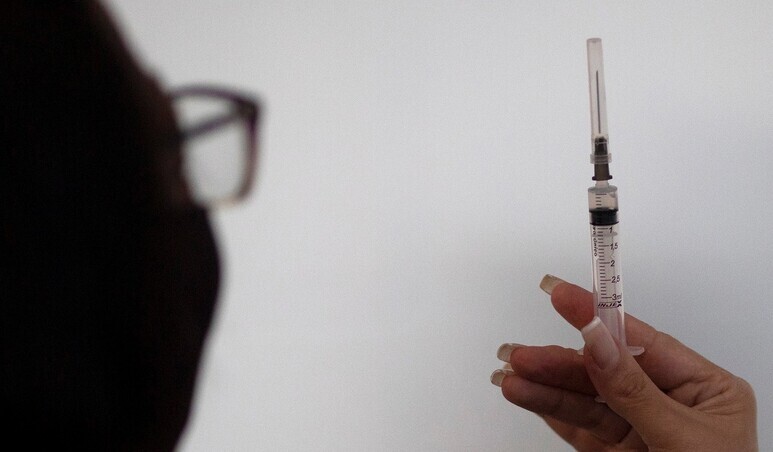hankyoreh
Links to other country sites 다른 나라 사이트 링크
Countries producing COVID-19 vaccines wage vaccine disinformation war

A behind-the-scenes battle over vaccine trust is unfolding among countries that are producing COVID-19 vaccines.
China and Russia have been drawing heat for what critics say are their efforts to spread false information that undermines trust in vaccines produced by Western countries. The US, for its part, is being accused of trying to stop the use of Russian vaccines in Brazil.
The problem is that with the claims being directed by ostensible “rivals,” it is unclear whether they can be viewed as factual.
The European Union’s European External Action Service (EEAS) released a report Wednesday claiming that China and Russia were spreading false information to undermine trust in Western vaccines. The 13-page report was based on an investigation of the period between December 2020 and April 2021, after the beginning of full-scale COVID-19 vaccine distribution.
Russia and China were accused of making full use of government-run and government-friendly media, along with social media services such as Facebook and Twitter. This included reports emphasizing the side effects of vaccines produced by Pfizer and AstraZeneca (AZ) — with some containing content bordering on conspiracy theories.
Examples include reports implicating vaccine side effects in the deaths of 23 Norwegian long-term care hospital patients who died after receiving the Pfizer vaccine or suggesting outright that the COVID-19 virus may have originated in secret US military research facilities.
“’Vaccine diplomacy’ has fully replaced ‘mask diplomacy,’” the EEAS said in its report, adding that Russia and China were spreading false or skewed information based on a “zero-sum game logic” to undercut the vaccines and vaccine strategies of the US, the UK and other Western countries to increase trust in their own vaccines.
On the opposite side from Russia and China, the US has also faced accusations of “attacking” other countries’ vaccines. This includes allegations that the US was behind Brazilian public health authorities’ decision Monday to refuse approval of the Sputnik V vaccine developed by Russia.
While Brazil insisted that the decision was a “scientific” one, the Wall Street Journal called it questionable in light of the country’s approval last January of the Chinese pharmaceutical company Sinovac’s COVID-19 vaccine in spite of unclear clinic trial results.
It also emerged in March that an annual US Department of Health and Human Services report published in January included “persuad[ing] Brazil to reject the Russian COVID-19 vaccine” as one of the diplomatic tasks of the department’s Office of Global Affairs.
With those efforts seemingly bearing fruition a month or so later, Russia has been vocally accusing the US of sabotage.
The US moved very quickly to approve vaccines developed by Pfizer, Moderna, and the Johnson & Johnson-owned company Janssen. But in the case of the vaccine developed by the UK company AstraZeneca, it has delayed approval procedures since last year, citing factors such as failure to report on the clinical trial process properly. The UK pharmaceutical community has accused the US of trying to keep Europe in check.
Roughly a dozen COVID-19 vaccines have been approved for use around the world. This includes the Pfizer vaccine and two others developed by the US; the UK-developed AZ vaccine; Sputnik V and one other Russian-developed vaccine; and four Chinese-developed vaccines, including the one by Sinovac.
By Choi Hyun-june, staff reporter
Please direct comments or questions to [english@hani.co.kr]

Editorial・opinion
![[Column] Tariffs on China: Trump was dumb, Biden dumber [Column] Tariffs on China: Trump was dumb, Biden dumber](https://flexible.img.hani.co.kr/flexible/normal/500/300/imgdb/original/2024/0520/191716191153918.jpg) [Column] Tariffs on China: Trump was dumb, Biden dumber
[Column] Tariffs on China: Trump was dumb, Biden dumber![[Column] What if Seoul took reunification by force off the table? [Column] What if Seoul took reunification by force off the table?](https://flexible.img.hani.co.kr/flexible/normal/500/300/imgdb/original/2024/0520/3017161928630494.jpg) [Column] What if Seoul took reunification by force off the table?
[Column] What if Seoul took reunification by force off the table?- [Editorial] Intensifying US-China rivalry means Seoul must address uncertainty with Beijing sooner than later
- [Column] When ‘fairness’ means hate and violence
- [Editorial] Yoon must stop abusing authority to shield himself from investigation
- [Column] US troop withdrawal from Korea could be the Acheson Line all over
- [Column] How to win back readers who’ve turned to YouTube for news
- [Column] Welcome to the president’s pity party
- [Editorial] Korea must respond firmly to Japan’s attempt to usurp Line
- [Editorial] Transfers of prosecutors investigating Korea’s first lady send chilling message
Most viewed articles
- 1Xi, Putin ‘oppose acts of military intimidation’ against N. Korea by US in joint statement
- 2Kim Jong-un wanted to meet with residents of shelled Yeonpyeong Island in South, Moon recalls in mem
- 3To weigh costs and benefits, Korea must stop treating US troop presence as a sacred cow
- 4[Column] What if Seoul took reunification by force off the table?
- 5Berlin mayor hints at tearing down ‘comfort women’ memorial in city
- 6[Column] Tariffs on China: Trump was dumb, Biden dumber
- 7[Editorial] Transfers of prosecutors investigating Korea’s first lady send chilling message
- 8[Exclusive] Truth commission to seek additional murder charges for figures behind 1980 Gwangju massa
- 9Naver’s union calls for action from government over possible Japanese buyout of Line
- 10[Column] US troop withdrawal from Korea could be the Acheson Line all over